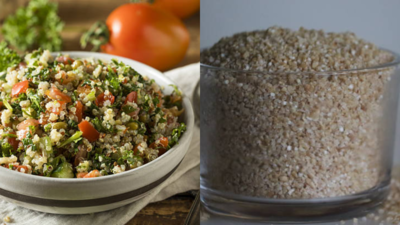- News
- lifestyle
- health-fitness
- health-news
- Quinoa vs Dalia: Which has more protein
Trending
Quinoa vs Dalia: Which has more protein
Quinoa, from South America's Andean region, provides high protein, gluten-free benefits, essential amino acids, dietary fiber, magnesium, iron, folate, and supports digestive health, ideal for vegetarians and vegans. Dalia, cracked wheat, offers 6 grams of protein per cooked cup, high fiber, iron, magnesium, zinc, and significant dietary value, making both suitable for healthy diets.

Quinoa and dalia are the two ends of a long spectrum of healthy diet. One is a recent addition in Indian food and the other is a witness to several generations.
Quinoa and dalia are alternatively recommended in a weight loss diet. Often seen as the traditional and modern alternatives of each, both the foods are the favorites of diet trackers.
While each of them is nutritionally dominant, let's understand the protein content of each of them.
Quinoa is exceptionally nutritional
International Yoga Day: How yoga impacts reproductive health in women?
One of quinoa's standout features is its high protein content. It is considered a complete protein, meaning it contains all nine essential amino acids that the human body cannot produce on its own. This makes quinoa a particularly valuable food for vegetarians and vegans looking to ensure they get a full complement of amino acids in their diet. On average, quinoa contains about 8 grams of protein per cooked cup (185 grams).
Quinoa isn't just about protein; it's also rich in other essential nutrients. It's a good source of dietary fiber, which supports digestive health and helps in maintaining a feeling of fullness. Quinoa is packed with vitamins and minerals such as magnesium, phosphorus, folate, and iron, contributing to overall health and well-being. Moreover, it's gluten-free, making it suitable for those with gluten intolerance or celiac disease.
Quinoa's status as a complete protein makes it particularly valuable for vegetarians, vegans, and anyone looking to diversify their protein sources. Its gluten-free nature also makes it suitable for those with gluten sensitivities or celiac disease.
One handful of dalia is just protein and fiber!
Dalia also boasts a respectable amount of protein. However, its protein content is slightly lower compared to quinoa. On average, a cooked cup (182 grams) of dalia provides approximately 6 grams of protein. While this is still a good amount, especially when considering it as part of a balanced diet, quinoa edges it out in terms of total protein content per serving.
Dalia, being a form of whole wheat, retains much of the nutritional benefits of wheat grains. It's a good source of fiber, particularly when compared to refined grains. Fiber aids in digestion, helps control blood sugar levels, and promotes a feeling of satiety. Dalia also contains essential minerals like iron, magnesium, and zinc, which are crucial for various bodily functions.
Dalia provides a good amount of protein and fiber while also offering the nutritional benefits of whole grains. It's a versatile ingredient that can be included in various dishes to enhance their nutritional profile.
Protein plays a crucial role in the diet by serving as the building blocks for tissues, muscles, and organs. It is essential for growth, repair, and maintenance of cells throughout the body. Proteins also contribute to the production of enzymes and hormones that regulate various bodily functions. Including adequate protein in the diet supports muscle development, boosts immune function, and helps maintain healthy skin, hair, and nails. Additionally, protein-rich foods contribute to feelings of satiety, aiding in weight management and overall energy balance. Thus, ensuring sufficient protein intake is vital for optimal health and well-being.
End of Article
FOLLOW US ON SOCIAL MEDIA









